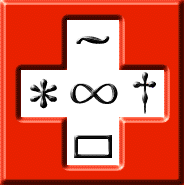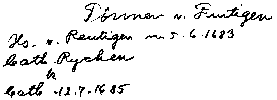
 |
|
| Assorted information | |
| This page is not
intended to answer Frequently
Asked Questions - it just
tries to provide some information, which does not readily
fit into another SwissGen page,
or some preliminary information which is to be expanded
into a separate SwissGen page at
a later stage. Let me know at wolf@seelentags.de
if you feel you have some useful information to be added
to this page. Should you have any queries regarding some
of the information displayed here, please contact the
submitter directly. As this page is of just preliminary nature, it will not be linked to the SwissGen main pages for the time being - if you feel you want to come back to check for new information, it will be best if you bookmark this page separately. |
1. Introductory information (submitted by Wolf Seelentag)
From several communications I have learned that a fairly common reason for disappointment are unrealistic expectations - due to insufficient information about any given service; this applies to "Swiss Genealogy on the Internet" as well as all the Swiss offices you may contact. Information given on this page will hopefully allow readers to better estimate what to expect, and in consquence should help to prevent disappointment.
SwissGen is not even trying to give a basic introduction into genealogy in general : if you are just beginning your genealogical research the internet will not be the best place to start anyway; it is to be recommended to visit your local library (many will have some introductory books on genealogy) or your regional genealogical society. Understanding some basics first will keep you from making mistakes which may be difficult, or at least time consuming, to correct at a later stage !
If you are a beginner at Swiss genealogy, you may also be able to find an introductory book at your library, or some help at a genealogical society - but there is also a very brief introduction on SwissGen. Before continuing your research you should also be familiar with the basic principles of Swiss citizenship and the important information you can find in Familiennamenbuch der Schweiz (Register of Swiss Surnames).
The Swiss Surname Directory will provide information on Swiss surnames, e.g. taken from the above mentioned Familiennamenbuch - so unless you are familiar with that source you will likely not understand the information you will receive from the Directory. As a matter of fact, you should familiarize you with all sources used by the Directory, in order to understand the responses.
Conclusion : There is very little information on Swiss genealogical resources available online, compared e.g. to the USA - as a consequence it's (with very few exeptions) impossible to get anywhere with your research, unless you access original sources, many of which have been filmed by LDS. SwissGen is managed by a rather small group of individuals, spending their spare time to help you - but can only try to get you started with your own research; please, don't expect us to do research for you : if you cannot research yourself, you'll have to hire a professional.
6. The Billeter collection : how to use it (submitted by Joan Bodenmann)
 |
To get an impression of Billeter's
notes, view these examples: Tönnen of Frutigen BE Thönen of Frutigen BE (1) Thönen of Frutigen BE (2) These examples were chosen as they are missing on the films for some unknown reason. |
Julius Billeter was a Swiss genealogist who between 1896 and 1950 researched many Swiss ancestral lines. Most of his information came from parish records, family and population registers and his earliest information came from land and tax records. Some of his research traces families from about 1900 back to the mid 1500s. There are over 1213 Swiss surnames researched in this collection of his handwritten notes. The complete surname index is included in the Swiss Surname Directory. A full list of families researched by Billeter is also available from the Family History Library Catalogue.
The original notes of this collection are located in Switzerland, but have been microfilmed. The films (23 rolls, # 0,193,466 - # 0,193,488) are available through Family History Centers throughout the world. Family History Centers are branches of the Family History Library in Salt Lake City, Utah.
To use this collection :
Here is an example from one of my lines: (My comments will be in italics.)
dates = day . month . year (von = of, locality)
NAEF V. URNAESCH
* father
Jacob (Jacob) married baptized
\/ Jb (Jb) m 27.10.1706 30.9.1667 (NOTE THE DATE)
Elisabeth *Sebastian baptized died
El Etter (Sebast) 9.1666 d 26.12.1747
k (kinder = children)
baptized
\/ Hs Jb (Hans Jacob) 1707
\/ Baschon 7.6.08
El (Elisabeth) 26.6.09 d 30.3.39
(additional children not listed here)
Jacob has \/ in front of his name. That means he will appear as a child in his father's family. It can also mean, in another situation, that an individual may appear as a parent or child elsewhere in the records.
Jacob * father married baptized died
\/ Jb (Anton) m 10.7.1659 25.6.37 11.8.99
*Conrad (II = 2nd spouse)
Anna Suner (Conr) m II 16.1.1707 Paulus Rechsteiner
c = children
Hans baptized
\/ Hs 12.8.1660
Jacob
\/ Jb 30.9.67 (NOTE THE DATE)
(additional children not listed here)
Next, you would look for Anton as a father with a child, Jacob, baptized 25.6.37. By this procedure you can trace back to the earliest ancestor.
Other abbreviations :
dyg = died young, as an infant
wid = widow
After you have established your ancestral line, go to the parish records and other original sources to check for any missing children, localities and data in question, and to verify your ancestral links : always keep in mind that this collection is a secondary source; it is perfect to get you started with your research - but for any serious research you should cross-check with the primary sources (which are unfortunately not quoted in Billeter's notes); you should especially for early mentions check whether the filiations can be proven, or have to be regarded as assumptions : read the critical appraisal of Billeter's work.
Some of the abbreviations for given
names, that this writer has seen in searching these
records, are as follows:
(For a complete list see Handy
Guide to Swiss Genealogical Records, by
Jared H. Suess).
| Andr = Andreas Ant = Anthon, Anton Burkh = Burkhard, Burkhart Casp = Caspar, Kaspar Chr = Christian Conr = Conrad, Konrad Dan = Daniel Fried = Friedrich Gg = Georg Gotff = Gottfried Gottl = Gottlieb Hs = Hans Heini = Heinrich Jb = Jacob, Jakob Jg = Joerg Joh = Johannes J = Johann Lienh = Lienhard, Lienhart Ludw = Ludwig Matth = Matthaeus Othm = Othmar Pet = Peter Rud = Rudolf, Rudolph Sam = Samuel Sebast = Sebastian Uli = Ulrich Wilh = Wilhelm |
Adelh = Adelheit,
Adelheit Ana = Anna Barb = Barbara Cath = Catharina, Katharina El = Elisabeth Elsb = Elsbeth Elsba = Elisabetha Lis = Lisabeth Magd = Magdalena Mar = Maria Marg = Margaretha Reg = Regula |
Further hints and a list of all abbreviations
may be found in the book:
Handy Guide to Swiss
Genealogical Research, Jared H.
Suess, The Everton Publishers, Inc. (92 pages, soft cover)
(p. 55-62)
To order contact : bob@everton.com
Application :
Missing Parish Records from Urnaesch, Appenzell A.R., Switzerland
Baptism - 37 years
Death and Burial - 37 years
Marriage - 34 years
Billeter researched certain Urnaesch ancestral lines before the disappearance of these records. His notes therefore may supply the missing generations.
7. Ordering books from the Swiss National Library (SNL) (submitted by Pete Mattli)
a. Access the Swiss National Library (SNL) at : http://www.snl.ch/
b. Or go directly to the Swiss National Library's product catalog, Helveticat, at : http://www.snl.ch/helveticat/english/
c. Other Swiss Libraries can also be accessed online. There is a web site at http://www.switch.ch/libraries/ which lists Swiss libraries and links to their homepages and catalogs.
d. Basic Word Search : The Swiss National Library
provides a basic word search at : http://www.snl.ch/helveticat/english/vtls-basic.html.
Book searches can be initiated by inserting the author, call
number, general keyword, subject or title.
e. Patron Number : A resident of Switzerland can
register as a user of the Swiss National Library and will be
given a Patron Number. This can expedite future service. For
further information on registering, contact the Lending Section
at Benutzung@slb.admin.ch.
If you do not live in Switzerland you can only order books from
the SNL by using the International Interlibrary Loan Program.
This program is available to all public libraries but not all
public libraries make use of it. Even if a certain library has
not used this service in the past, there is no reason they cannot
use it in the future. This is where good lobbying pays off !
The library in Salt Lake City (Utah) advises that all libraries
in the U.S. use the OCLC Clearinghouse to do book loaning between
countries. Up to three books can be ordered at a time. The
service is free in most cases.
On occasions where only a few pages are needed, it would be best
to request extracts. The SNL will then advise you of the fees and
these must be received before the extracts will be mailed.
f. Call Numbers : You must provide the SNL with a call number for the book you order. Call numbers can be found in the online catalog.
g. Restrictions on Loaning Books : There are certain restrictions in the lending policy of the Swiss National Library. As an example, books published before 1951 and certain periodicals and newspapers, can only be consulted in the library's reading rooms.
8. Was "Alsace-Lorraine" ever part of Switzerland ? (submitted by Guillaume Roelly)
Short answer : no ! "Alsace-Lorraine" is not a uniform region - it's a conglomerate of French districts; consequently the use of the expression "Alsace-Lorraine" is not recommended. See Help, my ancestors were from "Alsace-Lorraine" for a more detailed description.
Further info on Alsace (incl. a link to info on Lorraine) is also found on the German Genealogy Pages.
Topic Selection | Themenauswahl | Choix de Thèmes | Argomento